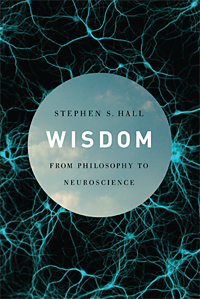 Wisdom: From Philosophy to Neuroscience
Wisdom: From Philosophy to Neuroscience
Stephen S. Hall
Alfred A. Knopf, 2010
333 pp., $27.95 cloth
Half a century ago science, measuring our behavior with its languages of experimental cause and effect, might typically draw objections if not outcries that we are not automatons, will-less and without free choice.
We are way beyond that now, and fascinatingly so in Stephen Hall’s new book, Wisdom. An award-winning journalist who has sought out frontiers that resonate with risk and mystery, from new macro- and micro-mapping concepts and technologies to the immune system and the commotions of blood that carry and test it, Hall has fastened his narratives to the thinkers who do the advanced work as well as to the labyrinths of the body we live in and learn from.
Recent neuroscience marks a new age of imaging the human, and Hall locates his almost too vast yet intimate subject in what we are coming to know about the brain. Although the teachings of such heroic figures as Socrates, Confucius, the Buddha, Saint Augustine, and Gandhi help to frame his findings, Hall’s concern is with our own everyday struggles. His “Patience” chapter graphs “neural correlates” of temptation and choice through a literally “hyperbolic warp” in perception, then opens inward upon tension between the impulsive limbic system of the brain and the prefrontal cortex (the delayed gratification part)—Grasshopper and Ant in the Aesop fable. Another chapter glimpses “discrete neural areas” conflicted over right and wrong. Embedded in us, apparently, is a hardwired “moral grammar.” I found the book often moving—research into how very old people value time, and how, beset by critical uncertainty, we may develop a “meta-wisdom” when to “rethink” an issue—looking not at once for answers but for an “approach.”
Compassion seemed to be especially emphasized when in March, at Manhattan’s Rubin Museum of Art, Hall and the NYU neuroscientist André Fenton had a discussion on the stage of a sold-out auditorium. Many questions from the audience turned upon how we are to act, behave, balance conflicting drives—which, coupled with the genial but uncontentious agreement between the principals, made Hall’s book (in my doubtless impatient opinion) seem less complex and profound than it is. I’m thinking, for example, of the “mirror neurons” that fire in empathy with someone else’s observed action—or is it the mysterious “seed” of growth in us, noted by the Dalai Lama during a meeting with Western scientists.
Humility, with what Hall calls its “arterial attachment to wisdom,” understands context and audience. For all the curious wonders reported in Wisdom, his approach has also a generous holism about it that points back to the overall intent of our will to live the best way we can.